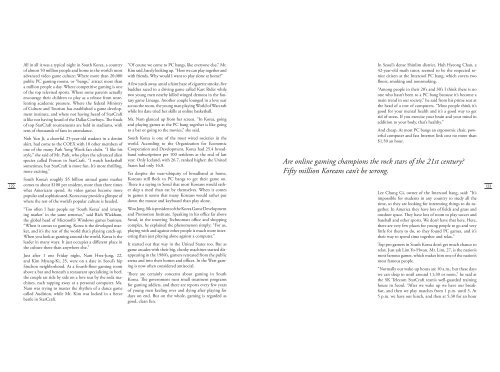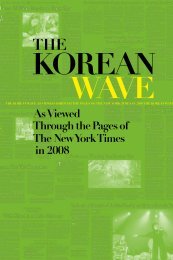The Korean Wave 2006 - Korean Cultural Service
The Korean Wave 2006 - Korean Cultural Service
The Korean Wave 2006 - Korean Cultural Service
Create successful ePaper yourself
Turn your PDF publications into a flip-book with our unique Google optimized e-Paper software.
122<br />
All in all it was a typical night in South Korea, a country<br />
of almost 50 million people and home to the world’s most<br />
advanced video game culture: Where more than 20,000<br />
public PC gaming rooms, or “bangs,” attract more than<br />
a million people a day. Where competitive gaming is one<br />
of the top televised sports. Where some parents actually<br />
encourage their children to play as a release from unrelenting<br />
academic pressure. Where the federal Ministry<br />
of Culture and Tourism has established a game development<br />
institute, and where not having heard of StarCraft<br />
is like not having heard of the Dallas Cowboys. <strong>The</strong> finals<br />
of top StarCraft tournaments are held in stadiums, with<br />
tens of thousands of fans in attendance.<br />
Noh Yun Ji, a cheerful 25-year-old student in a denim<br />
skirt, had come to the COEX with 10 other members of<br />
one of the many Park Yong Wook fan clubs. “I like his<br />
style,” she said of Mr. Park, who plays the advanced alien<br />
species called Protoss in StarCraft. “I watch basketball<br />
sometimes, but StarCraft is more fun. It’s more thrilling,<br />
more exciting.”<br />
South Korea’s roughly $5 billion annual game market<br />
comes to about $100 per resident, more than three times<br />
what Americans spend. As video games become more<br />
popular and sophisticated, Korea may provide a glimpse of<br />
where the rest of the world’s popular culture is headed.<br />
“Too often I hear people say ‘South Korea’ and ‘emerging<br />
market’ in the same sentence,” said Rich Wickham,<br />
the global head of Microsoft’s Windows games business.<br />
“When it comes to gaming, Korea is the developed market,<br />
and it’s the rest of the world that’s playing catch-up.<br />
When you look at gaming around the world, Korea is the<br />
leader in many ways. It just occupies a different place in<br />
the culture there than anywhere else.”<br />
Just after 1 one Friday night, Nam Hwa-Jung, 22,<br />
and Kim Myung-Ki, 25, were on a date in Seoul’s hip<br />
Sinchon neighborhood. At a fourth-floor gaming room<br />
above a bar and beneath a restaurant specializing in beef,<br />
the couple sat side by side on a love seat by the soda machines,<br />
each tapping away at a personal computer. Ms.<br />
Nam was trying to master the rhythm of a dance game<br />
called Audition, while Mr. Kim was locked in a fierce<br />
battle in StarCraft.<br />
“Of course we come to PC bangs, like everyone else,” Mr.<br />
Kim said, barely looking up. “Here we can play together and<br />
with friends. Why would I want to play alone at home?”<br />
A few yards away, amid a faint haze of cigarette smoke, five<br />
buddies raced in a driving game called Kart Rider while<br />
two young men nearby killed winged demons in the fantasy<br />
game Lineage. Another couple lounged in a love seat<br />
across the room, the young man playing World of Warcraft<br />
while his date tried her skills at online basketball.<br />
Ms. Nam glanced up from her screen. “In Korea, going<br />
and playing games at the PC bang together is like going<br />
to a bar or going to the movies,” she said.<br />
South Korea is one of the most wired societies in the<br />
world. According to the Organization for Economic<br />
Cooperation and Development, Korea had 25.4 broadband<br />
subscriptions per 100 residents at the end of last<br />
year. Only Iceland, with 26.7, ranked higher; the United<br />
States had only 16.8.<br />
Yet despite the near-ubiquity of broadband at home,<br />
<strong>Korean</strong>s still flock to PC bangs to get their game on.<br />
<strong>The</strong>re is a saying in Seoul that most <strong>Korean</strong>s would rather<br />
skip a meal than eat by themselves. When it comes<br />
to games it seems that many <strong>Korean</strong>s would rather put<br />
down the mouse and keyboard than play alone.<br />
Woo Jong-Sik is president of the Korea Game Development<br />
and Promotion Institute. Speaking in his office far above<br />
Seoul, in the towering Technomart office and shopping<br />
complex, he explained the phenomenon simply: “For us,<br />
playing with and against other people is much more interesting<br />
than just playing alone against a computer.”<br />
It started out that way in the United States too. But as<br />
game arcades with their big, clunky machines started disappearing<br />
in the 1980’s, gamers retreated from the public<br />
arena and into their homes and offices. In the West gaming<br />
is now often considered antisocial.<br />
<strong>The</strong>re are certainly concerns about gaming in South<br />
Korea. <strong>The</strong> government runs small treatment programs<br />
for gaming addicts, and there are reports every few years<br />
of young men keeling over and dying after playing for<br />
days on end. But on the whole, gaming is regarded as<br />
good, clean fun.<br />
In Seoul’s dense Shinlim district, Huh Hyeong Chan, a<br />
42-year-old math tutor, seemed to be the respected senior<br />
citizen at the Intercool PC bang, which covers two<br />
floors, smoking and nonsmoking.<br />
“Among people in their 20’s and 30’s I think there is no<br />
one who hasn’t been to a PC bang because it’s become a<br />
main trend in our society,” he said from his prime seat at<br />
the head of a row of computers. “Most people think it’s<br />
good for your mental health and it’s a good way to get<br />
rid of stress. If you exercise your brain and your mind in<br />
addition to your body, that’s healthy.”<br />
And cheap. At most PC bangs an ergonomic chair, powerful<br />
computer and fast Internet link cost no more than<br />
$1.50 an hour.<br />
Are online gaming champions the rock stars of the 21st century?<br />
Fifty million <strong>Korean</strong>s can’t be wrong.<br />
Lee Chung Gi, owner of the Intercool bang, said: “It’s<br />
impossible for students in any country to study all the<br />
time, so they are looking for interesting things to do together.<br />
In America they have lots of fields and grass and<br />
outdoor space. <strong>The</strong>y have lots of room to play soccer and<br />
baseball and other sports. We don’t have that here. Here,<br />
there are very few places for young people to go and very<br />
little for them to do, so they found PC games, and it’s<br />
their way to spend time together and relax.”<br />
Top pro gamers in South Korea don’t get much chance to<br />
relax. Just ask Lim Yo-Hwan. Mr. Lim, 27, is the nation’s<br />
most famous gamer, which makes him one of the nation’s<br />
most famous people.<br />
“Normally our wake-up hours are 10 a.m., but these days<br />
we can sleep in until around 11:30 or noon,” he said at<br />
the SK Telecom StarCraft team’s well-guarded training<br />
house in Seoul. “After we wake up we have our breakfast,<br />
and then we play matches from 1 p.m. until 5. At<br />
5 p.m. we have our lunch, and then at 5:30 for an hour<br />
123





